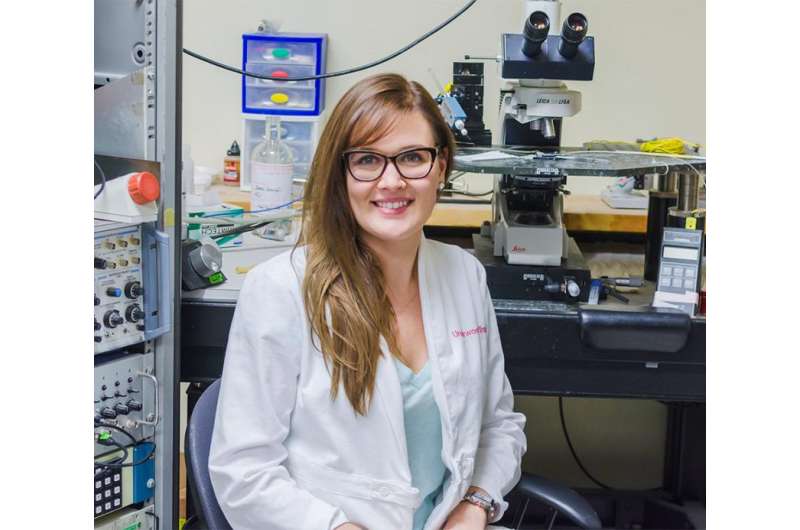Erica Underwood MS’12, an applied cognition and neuroscience doctoral student, studied how a high-fat diet affects memory.
In a first-of-its-kind study, UT Dallas researchers in the Aging & Memory Research Laboratory have determined that while short-term exposure to a high-fat diet can cause learning and memory to fade, that memory can recover over a longer period of time.
The same study also showed that in rats, the high-fat diet caused male animals to become severely diabetic after eating it for three to 12 months, while females did not.
The research by Erica Underwood MS'12, an applied cognition and neuroscience doctoral student, focused on animals that were fed a high-fat diet, compared to age-matched controls.
After three months, the high-fat diet caused both physiological and behavioral impairments to the subjects. The physiological changes were marked by reduced excitability of the primary output neurons in the hippocampus, which is the part of the brain involved in most forms of memory consolidation.
The behavioral impairments were demonstrated through severe deficits in spatial memory in both male and female animals, assessed with two independent tests. After animals placed in a grid-marked box containing two Lego-like toy objects became familiar with the box and location of the objects, the researchers then moved one object to a new location.
Later, when placed in the box, rats that ate high-fat foods for 12 weeks appeared confused and had difficulty remembering the novel location of the object. Similar severe memory impairments also were seen using a different spatial memory task.
After 12 months, physiological impairments in the hippocampus worsened, but the behavioral impairments—cognitive measures of learning and memory—went away.
"Other factors behind the impairment must be recovering in the long term," Underwood said. "That's the beautiful thing about the brain. It can often recover or find alternate routes to allow normal function in spite of impairment."
Dr. Lucien "Tres" Thompson, associate professor of neuroscience in the School of Behavioral and Brain Sciences and Underwood's advisor, said it isn't clear at what point between three and 12 months the learning and memory function returns to normal, nor what the mechanism of recovery is yet. But he said the finding is significant.
"We've never seen a situation in the hippocampus where this physiological deficit is present, but the cognitive function doesn't show diminished capacity," Thompson said.
In addition to the memory deficits at three months, the high-fat diet induced clinical symptoms of type-2 diabetes in male animals, but not in females. Those symptoms included elevated fasting blood glucose and the failure of glucose tolerance testing, both diagnostic markers set by the American Diabetes Association.
"We saw that the males' brains, as well as bodies, became insulin-insensitive. They were producing more insulin because of the fatty diet, but not enough to cover blood glucose surges after an oral dose of glucose. And while insulin normally stimulates hippocampal neurons, high-fat diet males stopped responding to insulin," Underwood said.
She said that females, however, exhibited decreased insulin release, which is not typical of diet-induced diabetes. At the same time, their neurons not only maintained insulin sensitivity, but actually became more sensitive.
Unlike the behavior deficits that recover after 12 months, the insulin insensitivity in the male animals worsened. Insulin sensitivity in females, on the other hand, remained stable, as did lack of diabetic symptoms.
Thompson said the research is the first to show in one study the sex-dependent effects of a high-fat diet on cognition, insulin sensitivity and the brain. It also broke ground in assessing effects of a high-fat diet over a substantial part of the lifespan. Most studies of this nature end after three months.
The researchers said there still are many questions to be answered about specific mechanisms that account for the memory switch and the profound sex differences. But with the increase of childhood obesity in the United States, the findings could be predictors for what happens to people as they age.
"For the first time in human history we have large numbers of toddlers who are severely overweight. It's unprecedented," Underwood said. "With this new type of physiology we're seeing, we don't really know what's going to happen to these children 20 or 50 years from now."
Results related to the research have been published in the journal Neural Plasticity.
Provided by University of Texas at Dallas





















